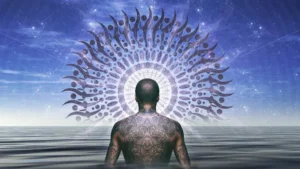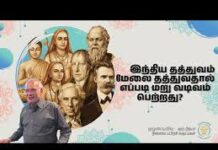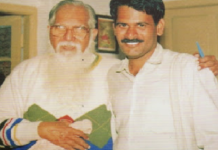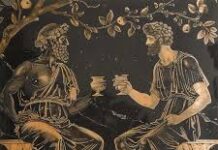
Does Vendanta lead to inaction?
There is a jargon among Indians ‘vetti (useless) vedanta’. It denotes blabbering with just logic. Vedantins are pictured as people who discuss the nuances of useless things.
This is just another usual statement of illiterates about any philosophy. Every Indian might have heard about vedanta. So, for them vedanta means philosophy. It is normal for the common folks to think of philosophy as something futile. This is because there is no utility in it, which they can relate to.
Does vedanta preach that you have to do nothing or there is no point in doing anything or doing nothing is the highest state? Will learning vedanta lead to inaction?
History negates this. Almost all of the Great Indian activists were vedantins, from Sankara to Vivekananda to Narayana Guru. Without them there is no Modern India… without vedantins even the structure called India would not have been there.
In India, it was possible only for the vedantins to do great service. Because their path is that of pure knowledge. So, they were able to overcome old beliefs and rituals. They could have dialogues with any ideology in the world. They could accept modern thoughts and discuss.
Contrary to this, orthodox and ritualistic religion will lead to stagnation. Orthodoxy binds humanity in a cycle. Ritualism makes men cling to the past. India was stagnating and inactive because of orthodoxy and ritualism. Vedanta retrieved it.
Vedism or poorva memasa and vedanta or uttara mimamsa are the two hindu ideologies that are alive even today. Both are contradictory to each other. Vedism is the path of action (karma marga) that preaches rituals and worships. Vedanta is the path of knowledge (gnana marga) that upholds pure knowledge.
Interestingly, both of them preach, in two different ways, supreme action as the path for salvation. Vedism stresses that there comes a state where all actions become sacrifice. Arts including medicine, archery, architecture are called upa-vedas. Reaching the pinnacle in those is also a sacrifice. That is the path for salvation. Vedanta says that actions should be carried out without any sentimental attachment and without any concern about the results. It shows this path called karma yoga for salvation.
No other book in the world’s philosophical tradition preaches action as the path for salvation as does Bhagavad Gita, the primary text of vedantic tradition. It reiterates action not just as a guidance. It philosophically classifies all sorts and stages of action. Sankhya (day-to-day) is one’s way, karma (service) is another’s and Gnana (knowledge) is another’s.
Famous lines of vedanta vigorously promote action. “Arise, wake up, march forward till you reach the objective’ says the Kata Upanishad.. The same Upanishad says the path of knowledge is like walking on a barber’s blade. We are here to be active, says the Gita. It concludes by saying, examine everything, even if it is a statement of God, with your intelligence.
Vedanta nowhere says that one should be lethargic, blaming fate. It speaks only about one doing his own actions, transcending through that and becoming content. Every individual should carry on with his actions till he has the force that keeps him active. He cannot understand what will be the effects of his actions, nor can he guide. It is a movement that has a grand unity. Vedanta calls it destiny.
Does vedanta speak about inaction? A winding clock has to run till the spring that has been wound up loses the tension. Only when that force becomes null, does the clock become free of action. Man comes here fully wound up.
Vedanta calls the inaction that results in that height as the freedom attained through action. It is the wholeness that you become part of, after doing your duties. The aim of running is to reach there.
‘What is the use of philosophy in day-to-day life?’ This question seems to be there always and everywhere. Even before 3000 years, Socrates and Aristotle have answered that question. At this point in time, Will Durant, in his famous book ‘The Story of Philosophy’, has given a wonderful answer to the same question and has written a short foreword. In another famous book ‘Sophie’s World’ Jostin Guarder answers the same question. This answer needs to be given time and time again.
The fact is that philosophy and day-to-day life are very much related to each other. Superficially they might look unrelated. It is due to the ways of research and discussion in philosophy. Philosophy never discusses anything in the context of routine and day-to-day life. It looks for an eternal solution for day-to-day problems. It seeks a universal solution for the entire humanity.
Thus it makes the problem a very nuanced one and breaks it into various aspects. It examines the relationship and the contradictions between each and every aspect. Gives a name to every aspect. Various explanations and theories are formed about the relationship or the contradiction. They have a dialogue among them. The names of every aspect and theory become technical terms.
When an aspirant enters the field he could only see a dialogue among technical terms. He will not be able to grasp the day-to-day use of it. It appears to be just a game of logic to him. First, he has to understand the technical terms, the theories and then should have a minute understanding of the problem. From there he should move on understanding the problem in the context of day-to-day life. Then will he understand how philosophy gives nuanced and useful answers.
He would also have another surprise. He would realise that hitherto his life has been based on those various answers found by philosophy in the past. He would know that the entire society has been taking shape and functioning based on the answers provided by philosophy.
When the Soviet Union disintegrated, I met a senior communist leader. He was shattered. He had spent 40 years of his life for the communist movement. He was imprisoned many times. He felt that everything had become wasteful. More than that, he thought his life had been wasted. Suddenly he burst out and started crying saying ‘what is the meaning of all these?’ From that question, I went on to write my novel “pin thodarum nizhalin kural’.
History is happening here. There are political upheavals. There are changes in the power game. Dynasties disappear. Is there any purpose for this course of history. Does any logic function in this? Or does everything happen on its own, without any logic ?
German philosopher Hegel said that if you delve into history you would see a logical system. When time marches ahead, man’s overall knowledge, societal setup, culture all appear to be growing. Man becomes more intelligent. Humanity gets consolidated. Individuals become equipped with unifiedl knowledge and mind.
A fundamental motivation which is innate in humans changes man. It goes on making him more powerful. This is what history shows. In spite of wars, pandemics, famines, political upheavals and destruction man becomes more and more powerful.
This is like an advancement which arises due to a clash between positive and negative forces. He calls this ‘dialectics’. You can easily understand it by looking at a bunch of ants pulling a food particle. If that bunch is cut in the middle with a blade, you can see every ant pulling it towards its own direction. But overall you can see the food particle moving ahead. That is called dialectics.
Man grows in history, like a tree. It grows overcoming drought, forest fire and takes in available water and other nutrients. It is due to the tree’s will to grow, the inherent motivation. Hegel explained this in his book ‘The Phenomenology of Spirit’.
Hegel’s student Carl Marx accepted that history moves forward. But it does not happen due the innate force in man. It is the result of economic forces that are external. Production, Distribution and Consumption are economic forces. Politics, Society, Religion, Culture are all dependent on them. Through the dialectics of those productive forces history happens. Through that history man goes on becoming mightier.
Hegel put forth Historical Materialism and Marx put forth Dialectical Historical Materialism. Both the philosophies have had detailed dialogues among them. Reading those dialogues would make one think that philosophy is just nuanced logic. But there are two answers in that dialogue to the tearful questions raised by that old communist.
History happens through dialectics. Everyone pulls it toward his/her own direction. It moves like one consolidated step forward. That comrade made his own contribution. He could not guess the path of history as a result of that. He put into action the will to move forward that is in the social psyche. So, he is a contributor to history. His actions were not useless. This would be Hegel’s view.
Marx would have seen this from a different angle and said this world marches ahead through dialectics of economic forces. This comrade made his contribution representing one of the economic forces. His force is part of history’s overall function. Humanity moves forward through many types of happenings. Man grows, a comrade takes part in it.
If any one of the answers could have satisfied him, he would have been saved from facing that void. His senility would not have been so harsh.
All Indian philosophical texts say ‘the fruit of philosophy is ‘dhukka nivarana’ . We tackle all of our sorrows only with philosophy. Those philosophies are age old and they have naturally come to us and are in our everyday speech. But so many new problems and questions keep arising. Philosophy has to find an answer to the sorrow that these problems and questions create.
Jeyamohan
Translated by Srinivasan












